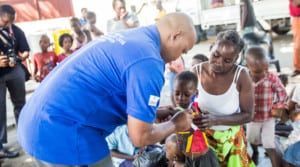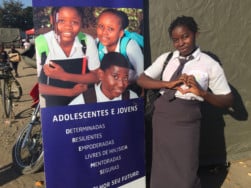Stories of Capacity Development: Community-based HIV Prevention and Response in Mozambique
July 13th, 2022 | Stories
Without this partnership [with Bantwana], ComuSanas would not be at the level it is today. And our aim is to maintain a strategic and lasting partnership.” – ComuSanas
To reduce the socioeconomic toll of HIV on vulnerable children and their caregivers in Mozambique, World Education’s Bantwana Initiative has partnered with multiple local organizations since 2015 to increase and improve targeted services for communities with high rates of HIV.
 When managing the Força a Comunidade e Crianças, or Community & Child Strengthening project (FCC) from 2015-2020, Bantwana worked closely with 15 partners, all of whom had deep footholds in their local communities. Through providing partners with planning, training, and follow-up support, we were able to deliver integrated health, education, and social protection services to more than 250,000 children and adolescents. By building the capacity of individuals, community structures, civil society organizations, and government bodies, FCC significantly enhanced community-based HIV prevention and response mechanisms across four provinces of the country.
When managing the Força a Comunidade e Crianças, or Community & Child Strengthening project (FCC) from 2015-2020, Bantwana worked closely with 15 partners, all of whom had deep footholds in their local communities. Through providing partners with planning, training, and follow-up support, we were able to deliver integrated health, education, and social protection services to more than 250,000 children and adolescents. By building the capacity of individuals, community structures, civil society organizations, and government bodies, FCC significantly enhanced community-based HIV prevention and response mechanisms across four provinces of the country.
Since 2019, Bantwana has collaborated with two FCC partners, ComuSanas (which means “Healthy Communities”) and the National Association for Self-Sustaining Development (ANDA), to continue this work. A first step was supporting them to apply for and receive direct funding, in line with USAID and PEPFAR localization goals. As a result, ComuSanas and ANDA now lead two active consortia of local partners that implement projects serving orphans and vulnerable children (OVC), adolescent girls, and those vulnerable to HIV, with Bantwana as their primary technical assistance (TA) partner. Our goal is to strengthen overall capacity through comprehensive and tailored organizational, financial, and program management skill-building, as well as technical assistance and advice on service design and delivery.
Through recent conversation with leaders from both organizations, we identified positive outcomes from our ongoing partnership. Bantwana’s technical assistance improves our partners’ programmatic, monitoring and evaluation, strategic information, and governance and leadership standards and practice. The organizations noted improvements in documentation quality and in program implementation capacity, through the introduction of new tools and models, especially Bantwana’s Siyakha Girls economic strengthening model.
According to ComuSanas:
“Through partnership with Bantwana, our level of documentation and capacity to capture the impact of our interventions has greatly improved. Their TA enabled us to not start from scratch. Instead, by training and transferring an array of tools for OVC and DREAMS programming, and supporting us to use them correctly, [Bantwana] made it possible to quickly provide OVC care and interventions that are based on evidence.”
ANDA leadership emphasized a range of positive outcomes of their partnership with Bantwana:
“Bantwana has supported us with donor management, design and implementation of our OVC project, and introduced us to the Siyakha model. Their TA approach has encouraged our staff to communicate regularly for continuous learning. They [Bantwana] have facilitated ANDA’s implementation to diversify the [OVC] services we offer and build resilience among the most needy families.”
 In 2021, Bantwana supported ANDA to pilot our Siyakha Girls model – a contextualized program that strengthens the economic resilience of vulnerable adolescent girls and young women. Noting the rapid and positive impact of Siyakha on girls and young women in their community, one ANDA leader said,
In 2021, Bantwana supported ANDA to pilot our Siyakha Girls model – a contextualized program that strengthens the economic resilience of vulnerable adolescent girls and young women. Noting the rapid and positive impact of Siyakha on girls and young women in their community, one ANDA leader said,
This capacity we have introduced through this [Siyakha] model to young women has revived them and given them an opportunity to dream safely and resiliently again.”
Based on the success of the Siyakha pilot with ANDA, USAID has requested and funded Bantwana to expand Siyakha Girls to additional Mozambican organizations in other provinces.
Both organizations articulated that receiving direct funding from USAID, coupled with Bantwana’s TA support, has enabled them to gain credibility as national organizations, build relationships with a broader range of stakeholders, mobilize resources, and have more opportunities to support communities in Mozambique.
Bantwana remains dedicated to achieving the best results in improving Mozambicans’ access to essential health, education, and social services. The ANDA and ComuSanas teams have a deep understanding of the needs of the communities they serve. Together, our partnership helps ensure that interventions are increasingly effective and sustainable for the long term.
World Education fosters enduring partnerships across regions and sectors to advance education outcomes for all. We offer education systems strengthening, program design and implementation, applied research and evaluation, capacity development, and policy development services.